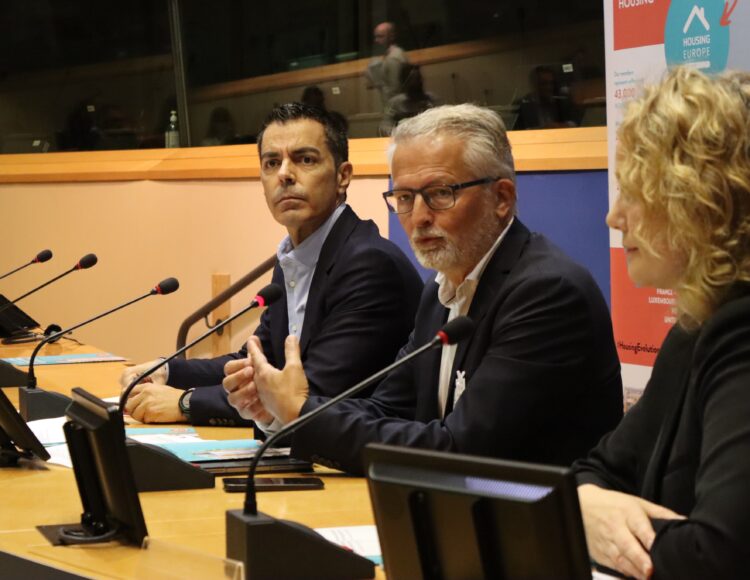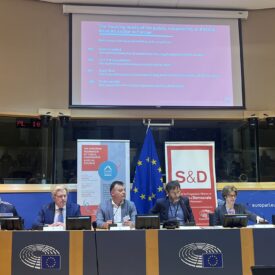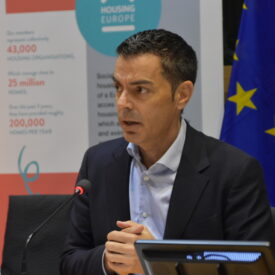On October 15, at the European Parliament, our President, Bent Madsen, called for 20 concrete actions aimed at redefining the EU’s approach to housing.
Central to this call was the need for EU funding to support public, cooperative, and social housing across all 27 Member States. Madsen also urged the European Commission to direct 100% of ETS II revenues to the Social Climate Fund, ensuring that half is allocated for energy efficiency initiatives in public, cooperative, and social housing or interventions targeting energy poverty. In addition, he highlighted the necessity of empowering the European Parliament to combat speculation in the housing market and establishing a single EU transformative fund for housing, alongside increased investment in social housing initiatives.
Read all 20 actions for a New Housing Paradigm.
The session, hosted by the S&D MEP Marcos Ros Sempere, brought over 100 housing providers, tenant organisations, and social services, all eager to amplify the voices of those on the frontline of housing issues and shape the forthcoming EU Affordable Housing Plan.
Marcos Ros Sempere emphasised the urgent need for action, reminding that “citizens need answers.” He also insisted that the EU regulation and funding must help committed actors deliver quality homes because “those on the streets of Amsterdam and Berlin need to see the light at the end of the tunnel.”
The imperative of homes’ quality and sustainability
Luciana Tomozei from the European Investment Bank (EIB) echoed this sentiment, asserting, “We want to move fast but also to move right.” She elaborated on the EIB’s plans for an economic assessment to map regulatory, social, and construction barriers, highlighting that while speed is essential, the quality and sustainability of solutions must not be compromised.
Marek Teplansky from the Commission’s DG REGIO further stressed the importance of integrating housing interventions into broader strategies. “Housing interventions must be part of a broader plan, as homes are linked to job integration, mobility, and competitiveness,” he explained. He raised critical concerns regarding the necessity for a proper understanding of market failures and the importance of involving the private sector in addressing housing needs.
From Austria, Gerlinde Gutheil working at the Austrian Federation of Limited-Profit Housing Associations (GBV) pointed out that “a large non-profit housing sector leads to significant economic benefits,” noting that market rents in non-profit housing are typically 27% lower than those in the private rental market. This insight highlighted the potential advantages of expanding the non-profit housing sector across the EU.
Echoing these concerns, Ruth Paserman from the Commission’s Directorate for Employment, Social Affairs, and Inclusion stressed the complexities involved in delivering effective housing policies. “To be able to deliver Housing First, we need to have housing first,” she asserted, indicating that adequate housing is fundamental for effective social policy and underscoring the urgency of prioritising housing in EU initiatives.
The irreplacable role of local authorities
Experts and policymakers looked at the future of the Renovation Wave in Europe and the role of local authorities in delivering a comprehensive affordable housing agenda. MEP Kim van Sparrentak expressed hope that the EU Affordable Housing Plan would evolve into a robust strategy that addresses homelessness while ensuring funding for renovations and social housing. “We need a robust budget and a strengthened cohesion policy to ensure that housing policy genuinely improves the quality of life for all citizens,” she stated, linking budgetary concerns directly to the effectiveness of housing policy.
Andres Jaadla, a Housing Europe Board member and member of the European Committee of the Regions, highlighted the need for a strong foundation for local authorities to effectively implement housing policies, urging that “we must ensure that local authorities are empowered to act decisively in tackling housing challenges, as they are often closest to the communities in need.”
Ensuring tenant rights
Emiliano Rocchetti from the International Union of Tenants raised concerns about transparency in the rental market, advocating for clarity on landlord identities to protect tenants from exploitation. “Tenants need to know who their landlords are. If they are in the dark, they will continue to be unprotected, and housing will remain a commodity,” he warned, calling for the implementation of at least 30% affordable housing quotas as a necessary step toward safeguarding tenant rights.
From Spain, José Maria Escolastico of the Spanish Social Housing Association (AVS) called for a deep analysis of the obstacles preventing the promotion of new homes in Spain. Rehabilitation with energy and environmental efficiency criteria is vital but so is universal accessibility. Escolastico pointed out that sometimes, a major change that people are hoping to see after renovation is lifts.
Ruth Owen from FEANTSA urged that any new housing paradigm should begin with a thorough assessment of housing needs across Europe. “Defining what ‘affordable’ means is a basic question we should discuss before getting into the EU Affordable Housing Plan,” she noted, highlighting the importance of establishing a common understanding of housing affordability as a prerequisite for effective policy-making.
A collective drive for action
From Germany, Özgür Öner from the Federal Association of German Housing and Real Estate Companies (GdW) said that the biggest EU Member State would need approximately 360,000 new homes per year to close the housing gap, stressing the urgency of addressing the housing crisis with decisive action.
MEP Ros Sempere encapsulated the urgency of the moment, reinforcing the collective commitment to action: “We need to ensure that housing is a fundamental right for all, and that means fighting speculation and promoting social investment across the board.”
Our Vice-President Christian Lieberknecht emphasised that housing as a human right should not be taken for granted, underscoring the need for ecological, social, and economic sustainability. He noted that while these challenges are not new, they have intensified over the past two years due to rising construction costs, impacted by both political regulations and Russia’s brutal attack on Ukraine. While regulation can drive positive change, he explained, it often comes with additional costs, leading to higher rents. He also argued that prioritising decarbonisation directly can be more effective than the efficiency first principle the EU has taken. Above all, Lieberknecht stressed the importance of restoring public confidence in politicians, scientists, and democratic institutions, underscoring that European actions must always be consulted locally.
Wrapping up the session, we were left to ponder an essential question posed by Martin van Rijn, Chairman of the Dutch Housing Corporations (Aedes): “Are EU policies fit for housing?”. The sector will be looking for this answer during the hearing of the designated Commissioner for Energy and Housing, Dan Jørgensen on November 5 from 14:30 to 17:30 CET. You can follow it live via this link.
If you missed our event at the Parliament, you can re-watch it here.


